Revolutionizing Portuguese Fields: The Digital Transformation of Agriculture
Smart agriculture is transforming Portugal’s farming landscape, combining centuries-old agricultural wisdom with cutting-edge technology to address modern challenges. As the nation’s agricultural sector faces labor shortages, climate variability, and increasing demands for sustainable production, innovative digital solutions are emerging as essential tools for the future of Portuguese farming.

The integration of Internet of Things (IoT) devices, artificial intelligence, drones, and precision farming techniques is not just modernizing agriculture – it’s revolutionizing how Portuguese farmers approach cultivation, resource management, and sustainability. This technological evolution promises to boost productivity while reducing environmental impact, positioning Portugal at the forefront of agricultural innovation in Europe.
The Portuguese Agricultural Landscape: Challenges and Opportunities
Portugal’s agricultural sector employs approximately 5% of the active population, yet manages to produce record values, reaching 6.84 billion euros in recent agricultural production. This remarkable efficiency demonstrates the sector’s evolution, particularly as it transitions from traditional methods to technology-enhanced practices.
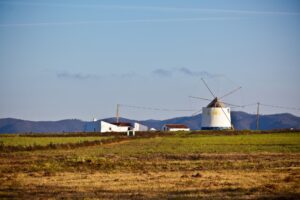
The country faces significant demographic challenges in agriculture. More than half of Portuguese farmers are over 65 years old, and historically, only 70% had basic education. However, a new generation of educated, tech-savvy farmers is emerging, bringing fresh perspectives and openness to innovation. These young farmers approach agriculture with a business mindset, viewing technology not as a threat to tradition but as a tool for enhancement.
Labor shortages represent another critical challenge. Portugal relies heavily on foreign workers for specialty crops, particularly those requiring manual harvesting. The combination of an aging farmer population and difficulty attracting younger workers to agricultural jobs has created an urgent need for technological solutions that can maintain or increase productivity with reduced human labor.
Climate change adds another layer of complexity. Portuguese farmers contend with extreme temperature swings, prolonged droughts, and unpredictable weather patterns. These environmental challenges make precision agriculture not just beneficial but essential for sustainable farming practices.
The Rise of IoT in Portuguese Agriculture
The Internet of Things has emerged as a game-changer for Portuguese agriculture, enabling real-time monitoring and data-driven decision-making. IoT sensors deployed across fields collect crucial information about soil moisture, temperature, nutrient levels, and environmental conditions, transmitting this data directly to farmers’ smartphones or computers.
Portuguese companies like Agroop have developed integrated IoT solutions specifically for the agricultural sector. Their Stoock multisensor system replaces traditional weather stations while monitoring and optimizing crop water needs. During a four-month case study with the Louricoop cooperative on potato cultivation, the technology demonstrated significant improvements in resource efficiency and crop management, showcasing the potential of tech innovation in traditional industries.
The SmartHive platform represents another advancement in IoT integration for Portuguese agriculture. This system connects various devices and sensors, creating a comprehensive network that optimizes crop management, natural resource utilization, and production processes. By providing real-time environmental monitoring, farmers can adapt their practices to local climatic and ecological conditions with unprecedented precision.

Water management, perhaps the most critical challenge in Portuguese agriculture, has particularly benefited from IoT implementation. Smart irrigation systems equipped with soil moisture sensors and weather monitoring capabilities allow farmers to optimize water usage, crucial in a country where the agricultural sector accounts for significant water consumption and faces increasing scarcity due to climate change.
Artificial Intelligence and Machine Learning Applications
Artificial intelligence is rapidly becoming integral to Portuguese farming operations, offering sophisticated analysis and predictive capabilities that were previously impossible. AI-driven systems process vast amounts of data from various sources – satellite imagery, weather stations, soil sensors, and historical yield data – to provide actionable insights for farmers.
The Jeevn AI Advisory System exemplifies this trend, delivering personalized farm advice, weather forecasts, and expert crop management strategies tailored specifically to Portuguese farmers’ needs. These AI systems can predict optimal planting times, identify early signs of disease or pest infestations, and recommend precise fertilizer applications based on real-time soil analysis.
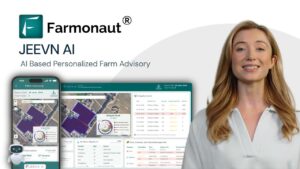
Machine learning algorithms are particularly valuable for pattern recognition in crop health monitoring. By analyzing multispectral imagery from satellites or drones, these systems can detect stress in plants before visible symptoms appear, enabling preventive interventions that save both crops and resources.
Portuguese startups are at the forefront of AI agricultural innovation. Companies like WiseCrop have developed platforms that serve as centralized dashboards for farmers, integrating multiple data streams and using AI to provide comprehensive farm management solutions. These platforms help farmers make informed decisions about everything from irrigation scheduling to harvest timing, demonstrating how Portuguese tech startups are solving real-world challenges.
Drone Technology: A Bird’s Eye View of Progress
Drones have revolutionized how Portuguese farmers monitor and manage their crops. These unmanned aerial vehicles, equipped with high-resolution cameras and multispectral sensors, provide detailed aerial imagery that helps farmers identify problems quickly and accurately across large areas.
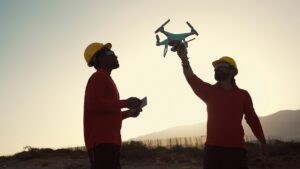
The applications of drone technology in Portuguese agriculture are diverse and expanding. Farmers use drones for crop health monitoring, identifying areas affected by pests or diseases, assessing irrigation efficiency, and even counting plants or fruit. The ability to capture NDVI (Normalized Difference Vegetation Index) data allows for precise evaluation of plant vigor and stress levels.
Portuguese companies like HPDRONES are leading the adoption of agricultural drones, offering solutions that range from simple monitoring to complex spraying operations. The DJI Agras T30, for example, can carry up to 40 kg of liquid payload and cover 16 hectares per hour, representing a massive increase in efficiency for tasks like pesticide application.
Research institutions are pushing drone technology even further. The University of Porto’s Wine4cast project uses micro-drones just 10 centimeters in size to inspect vineyards, counting grape clusters and berries to predict wine production. This level of precision helps vintners make better decisions about harvest timing and resource allocation.
However, regulatory challenges remain. Portugal currently prohibits drone spraying of phytopharmaceutical products, limiting some agricultural applications. Despite this, the demand for drone services continues to grow, with specialized companies providing data collection and analysis services to farmers who may not have the resources to purchase their own equipment.
Precision Agriculture and Smart Farming Platforms
Precision agriculture represents the convergence of multiple technologies to optimize farming practices at an unprecedented level of detail. Portuguese farmers increasingly adopt variable-rate technology, GPS-guided machinery, and data analytics platforms to maximize efficiency and minimize waste.
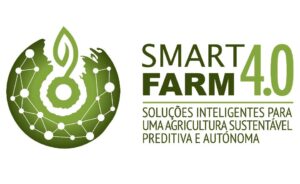
Smart Farm 4.0, Portugal’s first intelligent farm located at Companhia das Lezírias, serves as a national example of sustainable agricultural production. This ambitious project brings together 16 partners, including universities, research laboratories, and agricultural production entities, to develop innovative solutions based on Industry 4.0 technologies. These advancements align with Portugal Digital’s strategic objectives for digital transformation across all economic sectors.
Companies like Farmonaut are transforming Portuguese agriculture with comprehensive precision farming software. Their platform combines satellite imagery, weather data, and AI-driven insights to help farmers monitor crop health, optimize irrigation, and manage resources more effectively. The integration of blockchain technology for product traceability adds another layer of value, ensuring transparency throughout the supply chain.
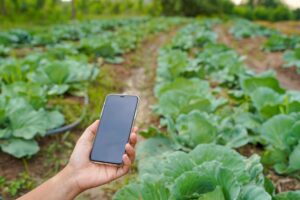
The benefits of precision agriculture extend beyond individual farms. By optimizing input usage – water, fertilizers, and pesticides – farmers reduce costs while minimizing environmental impact. This approach aligns perfectly with Portugal’s commitment to sustainable agriculture and the European Union’s Green Deal objectives.
Sustainability and Circular Economy Integration
Portuguese smart agriculture increasingly embraces circular economy principles, recognizing that sustainable farming requires more than just technological efficiency. The integration of digital technologies with sustainable practices creates synergies that benefit both farmers and the environment.

The LIFE GAIA Sense project exemplifies this approach, with demonstrators across Portugal focusing on reducing natural resource consumption while maintaining or increasing productivity. By combining IoT sensors, data analytics, and sustainable farming practices, the project aims to reduce water usage, minimize chemical inputs, and improve soil health.
Portuguese agricultural technology companies are developing solutions that support circular economy principles. For instance, biotechnology applications that transform agricultural waste into valuable products, smart composting systems that optimize organic matter recycling, and precision application technologies that minimize resource waste all contribute to a more circular agricultural system.
The economic benefits of sustainable smart agriculture are becoming increasingly clear. Reduced input costs, premium prices for sustainably produced goods, and access to green financing incentives make the business case for adopting these technologies compelling for Portuguese farmers.
The Role of 5G in Rural Connectivity
The rollout of 5G technology promises to revolutionize rural connectivity in Portugal, addressing one of the major barriers to smart agriculture adoption. The 5G.Rural project, led by DSTelecom, aims to bring high-speed connectivity to 70,000 people in remote areas of Alentejo, with specific applications for agriculture among its priorities.

This enhanced connectivity enables real-time data transmission from IoT sensors, supports high-resolution video streaming from drones, and facilitates the use of autonomous agricultural machinery. For farmers in traditionally underserved rural areas, 5G represents a leap forward in accessing and utilizing smart farming technologies.
ANACOM, Portugal’s communications regulator, has prioritized rural coverage in its 5G deployment strategy, recognizing that agricultural modernization depends on reliable, high-speed connectivity. By the end of 2024, all Portuguese municipalities had 5G coverage, though rural areas still lag behind urban centers in terms of infrastructure density. According to ANACOM’s official data, this infrastructure development is crucial for enabling advanced agricultural applications.
The implications for agriculture are significant. With 5G, farmers can implement more sophisticated IoT networks, use cloud-based AI services without latency issues, and even explore emerging technologies like augmented reality for equipment maintenance or training purposes.
Portuguese AgTech Startups Leading Innovation
Portugal’s startup ecosystem has produced numerous innovative companies addressing agricultural challenges with creative technological solutions. These startups are not only serving the domestic market but also expanding internationally, demonstrating the global relevance of their solutions and contributing to Portugal’s growing tech ecosystem.
Agroop stands out with its integrated platform combining software and IoT hardware to help farmers produce more with fewer resources. Their big data approach analyzes multiple variables to provide actionable insights, while their Stoock sensor monitors crucial environmental parameters.
CoolFarm has developed a flexible control system for indoor farming, compatible with various sensors and actuators. Their platform integrates artificial intelligence and machine learning to optimize growing conditions, particularly valuable for high-value crops in controlled environments.
WiseCrop offers a comprehensive farm management platform accessible via web and mobile devices. By serving as a centralized dashboard integrating various data streams, they simplify the complexity of modern farming for users who may not be technology experts.
Flow Technology focuses on the food industry with specific software and hardware solutions. Their SIGA Technology Platform provides integrated control over manufacturing processes, including production, quality, food safety, and traceability.
These startups benefit from Portugal’s supportive innovation ecosystem, including funding from FCT (Foundation for Science and Technology) and European Union programs. Their success demonstrates that Portugal can be a source of agricultural innovation with global impact, supported by initiatives from tech hubs and incubators across the country.
Research and Development: Academic Contributions
Portuguese universities and research institutions play a crucial role in advancing smart agriculture technologies. The Faculty of Sciences at the University of Lisbon, through projects like Smart Farm 4.0, leads research into autonomous and predictive agricultural solutions.
INESC TEC’s Laboratory for Robotics and IoT for Intelligent Precision Agriculture and Forestry, established in 2013, develops robotics and automation solutions for permanent crops like vineyards and orchards. Their work addresses the unique challenges of Portuguese terrain, including steep slopes and diverse microclimates.
The FCT funds numerous agricultural technology projects, from developing sustainable irrigation systems to creating AI models for crop disease prediction. Recent projects include research into using drones for precision viticulture, developing IoT sensors for urban agriculture, and exploring blockchain applications for food traceability. The Foundation for Science and Technology continues to support innovative research that bridges the gap between academic knowledge and practical farming applications.
Collaboration between academia and industry remains strong. Research institutions work closely with farmers and agtech companies to ensure their innovations address real-world challenges. This practical approach has resulted in technologies specifically adapted to Portuguese conditions rather than generic solutions imported from other markets.
Implementation Challenges and Solutions
Despite the promise of smart agriculture, Portuguese farmers face several challenges in adopting these technologies. The initial investment cost remains a significant barrier, with EMBRAPA research indicating that 67.1% of producers find the expense of machines, equipment, and applications prohibitive.
Digital literacy presents another challenge, particularly among older farmers who comprise a significant portion of the agricultural workforce. However, agricultural associations and government programs increasingly offer training and support to bridge this gap. The new generation of farmers, more comfortable with technology, often serves as catalysts for change within their communities.
Infrastructure limitations in rural areas, while improving with 5G deployment, still restrict some farmers’ ability to fully utilize smart agriculture technologies. Intermittent internet connectivity, limited electrical infrastructure, and distance from technical support centers all pose practical challenges.
To address these challenges, various stakeholders are developing solutions. Equipment sharing cooperatives allow smaller farmers to access expensive technologies. Government subsidies and EU funding programs reduce the financial burden of adoption. Agricultural consultants specializing in digital technologies help farmers navigate the complexity of available options.
Economic Impact and Return on Investment
The economic benefits of smart agriculture adoption in Portugal are becoming increasingly evident. Farmers report significant reductions in input costs, particularly for water, fertilizers, and pesticides, often achieving 20-30% savings while maintaining or increasing yields.
Labor productivity improvements are particularly valuable given Portugal’s agricultural labor shortage. Technologies that automate monitoring, reduce the need for manual field inspections, and optimize resource application allow farmers to manage larger areas with fewer workers.
Market premiums for sustainably produced goods provide additional economic incentives. Portuguese consumers increasingly value products grown using environmentally friendly methods, and export markets often pay premium prices for certified sustainable produce.
The return on investment for smart agriculture technologies varies by application and farm size, but many farmers report payback periods of 2-4 years. Government incentives and subsidies can significantly reduce this timeframe, making adoption more attractive for risk-averse farmers.
Future Prospects and Emerging Technologies
The future of Portuguese smart agriculture looks increasingly sophisticated, with several emerging technologies poised to further transform the sector. Autonomous agricultural machinery, including self-driving tractors and robotic harvesters, promises to address labor shortages while improving precision and efficiency.
Advanced biotechnology applications, including gene editing techniques adapted for local crop varieties, may help develop plants more resistant to climate change impacts. While regulatory frameworks for these technologies remain under development, Portuguese research institutions are actively engaged in this field.
Integration of renewable energy systems with smart farming infrastructure represents another frontier. Solar-powered IoT sensors, wind-powered irrigation systems, and biogas generation from agricultural waste all contribute to energy independence and sustainability.
Vertical farming and controlled environment agriculture, while still niche in Portugal, show promise for high-value crops and urban agriculture applications. These systems, heavily dependent on smart technology for optimization, could help address land constraints and water scarcity issues.
Cultivating a Digital Agricultural Future
Smart agriculture in Portugal represents more than technological adoption – it embodies a fundamental transformation in how the nation approaches food production. By embracing digital innovation while respecting traditional knowledge, Portuguese farmers are creating a model for sustainable, efficient agriculture that other countries may follow.
The convergence of IoT, AI, drones, and precision farming technologies offers solutions to the pressing challenges facing Portuguese agriculture: labor shortages, climate change, resource scarcity, and the need for sustainable production. While implementation challenges remain, the momentum behind smart agriculture adoption continues to build.
Government support, private sector innovation, academic research, and farmer enthusiasm combine to create a favorable environment for continued advancement. As 5G connectivity expands and costs decrease, even more farmers will access these transformative technologies. For businesses looking to enter this growing market, The Portugal Tech Hub offers comprehensive digital services to help navigate this evolving landscape.
The success of Portuguese smart agriculture will ultimately be measured not just in increased yields or reduced costs, but in the sector’s ability to sustainably feed the nation while preserving natural resources for future generations. With continued innovation and adoption, Portugal is well-positioned to achieve this balance, demonstrating that tradition and technology can work together to create a more productive and sustainable agricultural future 🌱
As Portugal continues its journey toward agricultural digitalization, the collaboration between farmers, technology providers, researchers, and policymakers remains crucial. The nation’s agricultural sector stands at an exciting crossroads, where centuries of farming wisdom meet 21st-century innovation. This combination promises not only to address current challenges but also to position Portuguese agriculture as a leader in sustainable technology and food production for decades to come.
